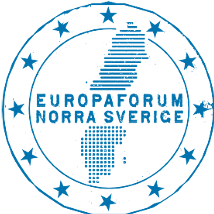Europaforum Northern Sweden (EFNS) is a network of politicians on local and regional level from Norrbotten, Västerbotten, Jämtland Härjedalen och Västernorrland. EFNS is a knowledge arena to analyse EU policies and discuss how they affect Northern Sweden. EFNS monitors European issues to influence EU legislation, EU strategies and action programmes, as well as the EU Budget. The objective of EFNS is to safeguard the interests of northern Sweden in EU policies with communication aimed towards both the European institutions and the national level.
Europaforum Northern Sweden welcomes the proposal for a new national ESF+ programme
The European Social Fund (ESF) is an important tool for employment and skills provision in our regions. The Europaforum of Northern Sweden (EFNS) point of departure is the need for regional adaptation in the implementation of the fund, where we mainly argue for regional programs to meet the needs. Now when the Swedish ESF Council has presented its proposal for a national programme, EFNS wants to begin by commending the managing authority for constructive dialogues and an open process in the preparation of the proposal. This applies not least to the parts relating to the special allocation to the Northern Sparsely Populated Areas (NSPA), which are now found within the framework of the ESF+. EFNS considers that the proposal well describes the special conditions in the northernmost regions, providing potential to allow for well-directed efforts in these regions.
EFNS also express support for the flexibility that ESF+ can provide as different target groups are not locked to individual programme areas. The combination of broader target groups and increased opportunities for interventions at the organizational and structural levels also means a significant improvement in comparison to the current programme period.
For an effective and goal-oriented implementation of the programme as a whole, it is now of utmost importance that the regional action plans have a clear regional character, both in design and implementation. The northernmost regions consider ESF+ to be an important part of the regional development work. Collaboration with the organisations responsible for regional development is therefore crucial in implementing the ESF+. Regional adaptation would positively impact and create better conditions for the individuals, organizations and systems concerned.
Importance of regional influence over ESF+
Organisations responsible for regional development will together with the ESF Council develop regional action plans at NUTS 2 level prior to the implementation of the ESF+. The action plans shall describe the specific conditions of the regions and form the basis for regional priorities and calls for project proposals. Prior to the development of these plans, organisations responsible for regional development have on behalf of the ESF Council produced regional socio-economic analyzes.
The proposal for a national programme for ESF+ emphasizes that strategies should be developed in eachand every action plan and that the project calls should have a clear link to them. The regions have a large network of contacts with key stakeholders and deep knowledge, which gives thema central role in the implementation of the Social Fund. EFNS therefore calls on the government and the ESF Council to engage in close cooperation with the regions throughout the programme period.
- EFNS sees the ESF+ as animportant part of regional development work and requires close cooperation between the ESF Council and the organisations responsible for regional development in both the drafting of the action plans and the implementation of ESF+ 2021-2027.
- EFNS wants to ensure that the 25 percent of the Swedish allocation that is exempted from the regional action plans for managing the Swedish Public Employment Service (SPES) will be adapted to regional conditions.
Higher co-financing requirements endanger the implementation
According to the national proposal the extra allocation will support efforts to strengthen the capacity in the sparsely populated areas. Specific funds are directed to regions with long distances, low population volumes and limited capacity for development work. The extra allocation is welcome, but other programme areas also need to take into account the northernmost regions’ ability to achieve good results in the implementation.
In the sparsely populated areas, with limited capacity, few and small stakeholders, access to local and regional co-financing is limited. This means that the proposal for increased co- financing requirements challenges many stakeholders’ opportunities to run projects.
A significant part of the co-financing of ESF projects consists of publicly financed remuneration for job-seeking participants, such as activity support through SPES. The ESF Council’s decision to direct Programme Area B of ESF+ in its entirety to the SPES, entails a risk that other projects within the ESF+ will not be able to target job seekers, enrolled in the SPES. The proposal reduces opportunities for co-financing and feasibility.
Furthermore, reduced opportunity for co-financing greatly affects the possibility of implementing ESF projects aimed at individuals outside the labour market in the four northernmost regions.
The EU Commission’s proposal for increased co-financing requirements from 50% to 60% creates additional barriers to implementing projects in the four northernmost regions. The co-financing principles should be based on the specific conditions of the regions. EFNS therefore wants to highlight the need for increased national co-financing for the four northernmost regions.
- EFNS believes that the opportunities for co-financing are reduced through the SPES’s activity support and the requirement for increased co-financing, in combination with specific challenges that needs to be compensated with national funds to ensure that the actual funding for project owners does not exceed 50%.
Adopted by Europaforum North Sweden on May 8, 2020
Glenn Nordlund (S) President EFNS Region Västernorrland
Åsa Ågren Wikström (M) Vice president EFNS Region Västerbotten
Jonny Lundin (C) Region Västernorrland
Erik Lövgren (S) Kommunförbundet Västernorrland
Rickard Carstedt (S) Region Västerbotten
Ann Åström (S) Region Västerbotten
Nils-Olof Lindfors (C) Region Norrbotten
Britta Flinkfeldt (S) Norrbottens Kommuner
Anders Josefsson (M) Norrbottens Kommuner
Elise Ryder Wikén (M) Region Jämtland Härjedalen
Robert Uitto (S) Region Jämtland Härjedalen
Thomas Andersson (C) Region Jämtland Härjedalen
Daniel Danielsson (C) Kommunerna i Jämtlands län
efns-view-on-the-proposal-for-a-national-esf-programme-2021-2027.pdf
